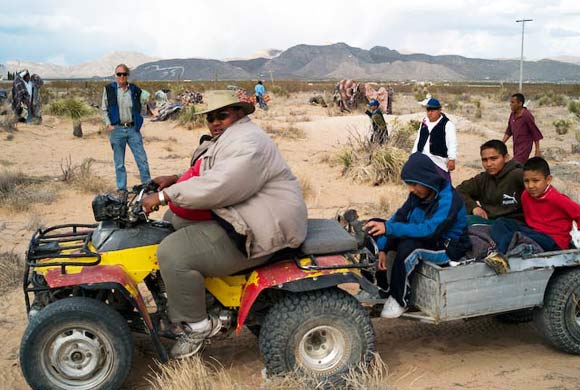Juarez: Murders, Messages
![]() We’ve posted a new photo-essay by Scott Carrier and Julián Cardona, “Ciudad Juárez: Murders, Messages…”
We’ve posted a new photo-essay by Scott Carrier and Julián Cardona, “Ciudad Juárez: Murders, Messages…” 
![]() We’ve posted a new photo-essay by Scott Carrier and Julián Cardona, “Ciudad Juárez: Murders, Messages…”
We’ve posted a new photo-essay by Scott Carrier and Julián Cardona, “Ciudad Juárez: Murders, Messages…” 
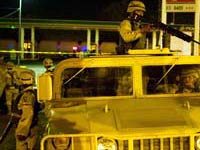
![]() Hearing Voices from NPR®
Hearing Voices from NPR®
048 Juárez, Mexico: City on the Border
Host: Scott Carrier of Hearing Voices
Airs week of: 2010-04-28 (Originally: 2009-01-28)
“Juarez, Mexico” (52:00 mp3):
We go to a war zone, just to our south:
Four years of reports on life in the Mexican border-town of Ciudad Juárez, with poverty and corruption, with daily drug-cartel murders and military violence. Told by photographer/Juarez resident Julián Cardona, author Charles Bowden, and host Scott Carrier.
![]()
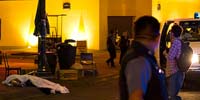 (Part 3 of 3) When people in Juarez, Mexico say ‘drug cartel,’ they mean not only street gangs, but also the government, the military, big business, small business, the upper, middle, and lower classes, the justice system, and the media. Aired on NPR Day to Day; by producer Scott Carrier, “Juarez: Crime More Powerful Than Government” (7:46 mp3):
(Part 3 of 3) When people in Juarez, Mexico say ‘drug cartel,’ they mean not only street gangs, but also the government, the military, big business, small business, the upper, middle, and lower classes, the justice system, and the media. Aired on NPR Day to Day; by producer Scott Carrier, “Juarez: Crime More Powerful Than Government” (7:46 mp3):
This Hearing Voices series was produced by Julian Cardona, Scott Carrier and Lisa Miller; Edited by Deborah George; Translation and Research by Molly Molloy, research librarian at New Mexico State University- Las Cruces; Additional assistance from Erin Almeranti, Elaine Clark.
![]()
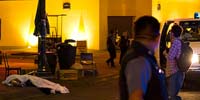 (Part 2 of 3) The Army invades the streets of Juarez, Mexico. Citizens die and disappear. And the military may be as guilty as the drug cartels. Aired on NPR Day to Day; by producer Scott Carrier, “Juarez: Street Gangs, Government Gangs” (7:46 mp3):
(Part 2 of 3) The Army invades the streets of Juarez, Mexico. Citizens die and disappear. And the military may be as guilty as the drug cartels. Aired on NPR Day to Day; by producer Scott Carrier, “Juarez: Street Gangs, Government Gangs” (7:46 mp3):
This Hearing Voices series was produced by Julian Cardona, Scott Carrier and Lisa Miller; Edited by Deborah George; Translation and Research by Molly Molloy, research librarian at New Mexico State University- Las Cruces; Additional assistance from Erin Almeranti, Elaine Clark.
![]()
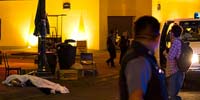 (Part 1 of 3) Murders in Juarez, Mexico now number thousands per year. Photojournalists docuemnt each one. Is it true that “God has a purpose for this city?”. Aired on NPR Day to Day; by producer Scott Carrier, “Juarez: Shooting Crime Scenes” (7:47 mp3):
(Part 1 of 3) Murders in Juarez, Mexico now number thousands per year. Photojournalists docuemnt each one. Is it true that “God has a purpose for this city?”. Aired on NPR Day to Day; by producer Scott Carrier, “Juarez: Shooting Crime Scenes” (7:47 mp3):
This Hearing Voices series was produced by Julian Cardona, Scott Carrier and Lisa Miller; Edited by Deborah George; Translation and Research by Molly Molloy, research librarian at New Mexico State University- Las Cruces; Additional assistance from Erin Almeranti, Elaine Clark.
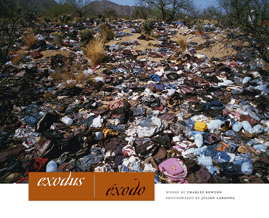 Exodus/Éxodo is a new book (Amazon) with words by Charles Bowden and photographs by Julián Cardona . Excerpt:
Exodus/Éxodo is a new book (Amazon) with words by Charles Bowden and photographs by Julián Cardona . Excerpt:
Consider this: you get up at 5 a.m. You live in a one-room shack and pay $59 a month in rent. Your address is on the outskirts of the world’s second largest megalopolis, México City. You share this shack with your woman, a niece and your child. At 5:30 a.m. you’re on the bus, a ninety-minute ride for $2.45 a day roundtrip. You work in a tortilla shop for $1.64 an hour, eleven hours a day, six days a week. A gallon of milk at the store, the electricity that lights your shack, the fuel running the bus, all these things cost more than in the United States. Basically, everything costs more than in the United States — except labor.
…
Mexican civilization existed before the American people were even a thought. Americans have come to the game very recently, and like so many new arrivals believe they possess all the answers. At the moment, human beings are moving all over the planet to save their hides. Things have been upended, the moon rises at a strange hour, it is blood red, and dripping with hunger.
[Scott Carrier is working on an HV Hour about the murders in Juárez, Mexico, starting with his NPR series, then moving onto the current much, much worse situation. The following are some emails from Scott…]
Yesterday Armando Rodriguez, the journalist who’d written most of the stories (901) on this year’s executions in Juárez Mexico, was himself executed:
Juarez journalist slain
El Pasa Times staff report 11/13/2008
A Juarez journalist known for his work as a crime reporter for El Diario de Juarez was gunned down Thursday morning in front of his home, the newsapaper’s Web site reported.
Armando Rodriguez was preparing to take his daughter to school in Juarez when a gunman approached his car and fired several shots at point-blank range, according to accounts provided by the newspaper. Rodriguez reportedly died at the scene.
The assailant then fled to a waiting car carrying other men and sped off in an unknown direction.
Rodriguez was the police beat reporter for El Diario de Juarez and had become an expert on the brutal drug cartel violence that has gripped Juarez for the last several years.
“He was a good person and a good reporter,” said KINT-TV (Univision Ch. 26) reporter Pedro Villagrana, who has worked closely with Rodriguez for more than a decade.
Word of Rodriguez’ slaying quickly spread throughout the Juarez and El Paso journalism community. Some members of the Juarez media including his colleagues at El Diario de Juarez gathered at the crime scene to mourn his death, according to the newspaper Web site.
Juárez has always been a violent place. No rule of law. People get killed and nobody is arrested, not even an investigation. What’s new now is the rate of murders. There are more than 100 executions each month in Juárez, 1300 this year alone. Last year there were about 300.
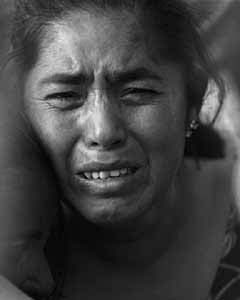
Paula Flores attends the burial of her daughter Sagrario Gonzalez,
a maquiladora worker abducted and killed in April 1998.
(Photo © Julián Cardona)
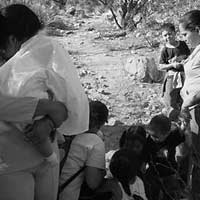
![]() Hearing Voices from NPR®
Hearing Voices from NPR®
013 Crossing Borders: From Mexico to US
Host: Marcos Martinez of KUNM-Alberquerque
Airs week of: 2012-01-18 (Originally: 2008-05-28)
“Crossing Borders” (52:00 mp3):
A Tale of Two Countries:
In “Sasabe,” a Sonora, Mexico border town, Scott Carrier talks to immigrants on their hazardous, illegal desert crossing, and to the border patrol waiting for them in Sasabe, Arizona.
Luis Alberto Urrea reads from his books Vatos and The Devil’s Highway, about death in the desert.
Guillermo Gómez-Peña imagines “Maquiladoras of the Future,” fantasy border factories.
“And I walked…”, by Ann Heppermann and Kara Oehler, is a sound-portrait of Mexicans who risk their lives to find better-paying jobs in the United States.
And sounds from the Quiet American’s one-minute vacation.
Photos © 2004 Julián Cardona from Sasabe, Sonora, Mexico :


Author Charles Bowden on the border, © 2008 Julián Cardona:
